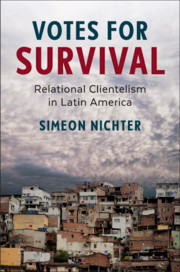Book contents
- Frontmatter
- Dedication
- Contents
- List of Figures
- List of Tables
- Acknowledgments
- 1 Introduction
- Part I Electoral Clientelism
- Part II Relational Clientelism
- 3 Citizens and Relational Clientelism
- 4 Income and Vulnerability
- 5 Declared Support
- 6 Requesting Benefits
- Part III Extensions
- Appendix A Description of Qualitative Fieldwork
- Appendix B Description of Surveys
- Appendix C Signaling Model of Declared Support
- Appendix D Regression Tables for Declared Support
- Appendix E Regression Tables for Requesting Benefits
- Appendix F Regression Tables for Comparative Chapter
- Bibliography
- Author Index
- Subject Index
- Cambridge Studies in Comparative Politics
5 - Declared Support
from Part II - Relational Clientelism
Published online by Cambridge University Press: 06 December 2018
- Frontmatter
- Dedication
- Contents
- List of Figures
- List of Tables
- Acknowledgments
- 1 Introduction
- Part I Electoral Clientelism
- Part II Relational Clientelism
- 3 Citizens and Relational Clientelism
- 4 Income and Vulnerability
- 5 Declared Support
- 6 Requesting Benefits
- Part III Extensions
- Appendix A Description of Qualitative Fieldwork
- Appendix B Description of Surveys
- Appendix C Signaling Model of Declared Support
- Appendix D Regression Tables for Declared Support
- Appendix E Regression Tables for Requesting Benefits
- Appendix F Regression Tables for Comparative Chapter
- Bibliography
- Author Index
- Subject Index
- Cambridge Studies in Comparative Politics
Summary
Chapter 5 examines declared support, a key mechanism by which citizens signal the trustworthiness of their vote promises and thereby fortify relational clientelism. Many Brazilians make public declarations in favor of candidates. While their reasons are multifaceted, evidence points to the role of vulnerability; for example, declarations significantly increase during droughts in rural Northeast Brazil. The chapter demonstrates a substantial link between declared support and relational clientelism. Evidence reveals widely shared perceptions that declarations affect whether citizens receive ongoing benefits. Beyond these perceptions, analyses suggest that Brazilians who declare support for victorious candidates are indeed more likely recipients of benefits during election and non-election years. Consistent with the logic of signaling elaborated in Chapter 3, qualitative and quantitative evidence suggests that declared support is indeed informative, as citizens overwhelmingly vote and hold perceptions in accordance with their declarations. By allaying politicians’ concerns about their trustworthiness, declared support enables many Brazilians to help sustain relational clientelism.
Keywords
Information
- Type
- Chapter
- Information
- Votes for SurvivalRelational Clientelism in Latin America, pp. 113 - 148Publisher: Cambridge University PressPrint publication year: 2018
